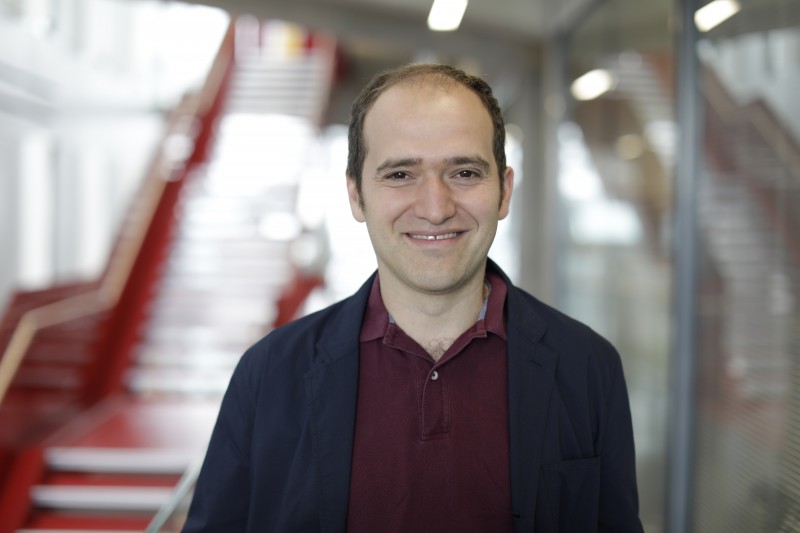By Sophie Arthur
November 30, 2020
Time to read: 4 minutes
We are extremely proud of all our colleagues who are contributing to the COVID-19 emergency response. We are celebrating their contributions in this series: ‘LMS Emergency Response to COVID-19’. Today, we introduce you to one of our Group Heads, Mikhail Spivakov, who, along with the Functional Gene Control group and start-up company Enhanc3D Genomics, is collaborating on COVID-19 research.

Our work is in partnership with the COVID-19 Host Genetics Initiative (HGI) – an informal international consortium of human geneticists initiated by scientists at the Broad Institute in the USA and the Institute for Molecular Medicine in Finland. This initiative aims to combine the power of multiple cohorts of COVID-19 patients versus healthy donors. The aim is to understand which genetic variants – mutations in our DNA sequence – are associated with the severity of this disease.
To do this, scientists perform genome-wide association studies (GWAS) for multiple traits related to COVID severity. This means looking across the entire genome in different individuals to see if any genetic variant is associated with a trait, in this case COVID severity.
Variants identified by using the GWAS approach are often found at enhancer elements – regulatory regions in the DNA sequence that control gene expression. However, some enhancers can be found considerable distances away from the genes that they control. We are looking to identify which enhancers contain genetic variants that are linked to COVID severity, and then look at what genes those enhancers control in 3D.
We do this by combining GWAS data with insights from 3D chromosomal contacts between enhancers and their target genes. Using this approach, we have revealed dozens of potentially relevant genes with known functions in the immune system and in the lung. For results, please see the link at the bottom of the page.
Let me describe our approach in a bit more detail. It is already known that enhancers are able to act over large genomic distances because their form contacts with their target genes in the 3D space of the nucleus of a cell – by a process known as DNA looping. We have previously used a high-resolution technique called Promoter Capture Hi-C to generate a catalogue of these gene-enhancer contacts – in human blood and endothelial cells (joint work with Peter Fraser’s lab then at Babraham Institute and haematologists Willem Ouwehand and Mattia Frontini at Cambridge University).
In collaboration with population geneticists at the University of Cambridge (Chris Wallace and Oliver Burren), we then brought together these two sets of data – the catalogue of data on 3D enhancer contacts, and GWAS data that links genetic variants at enhancers with traits.
We did this by developing a statistical algorithm which pinpoints those genes whose regulation is potentially affected by each variant within an enhancer – in a statistically rigorous way. The findings were presented in a paper in research journal Cell (Javierre et al., Cell 2016).
Now, in collaboration with my start-up company, Enhanc3D Genomics (co-founded with Peter Fraser and colleagues), we have used these data and the analysis algorithm to pinpoint the 3D connections between genetic variants associated with COVID severity within enhancers and the genes that they control. We find that genes relevant to COVID severity include those involved in interferon response and other immune functions, as well as lung biology. Our results will aid in the understanding of COVID-19 pathology, paving the way for novel treatments.
DISCLAIMER: In-silico analyses posted via the link below are uploaded by partners of the COVID-19 HGI, but not peer reviewed or subjected to extensive quality control by the community. Please keep that in mind if and when using or referring to these results.
The current results are available here: https://www.covid19hg.org/blog/2020-10-22-in-silico-follow-up-results-for-freeze-v4/ (subsection “Prioritization of putative target genes underpinning COVID-19 host GWAS traits based on high-resolution 3D chromosomal topology”).